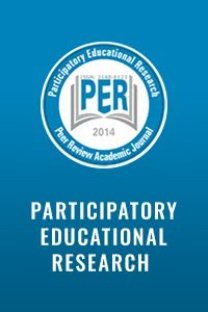Researching into a Course of Information Technologies and Software in The Context of Digital Citizenship through Student Opinions
Information technologies literate is an individual who produces information, can use it functionally in life, can solve problems, think critically, has entrepreneurial, stable, communication skills, empathizes, contributes to society and culture etc. The purpose of this research is to examine the effectiveness of “Information Technologies and Software Course (ITS)” in gaining knowledge, skills and values of digital citizenship with student views. Mixed research method has been adopted in the research. The sample of the study consisted of 150 students attending the 5th and 6th grade students in a public secondary school in Aksaray province in the 2018-2019 academic year. 50 students (33.3%) were in the fifth grade and 100 (66.7%) were in the sixth grade and 86 (57.3%) were female and 64 (42.7%) were male. “Digital Citizenship Scale (DCS) in ITS Scale” developed by Elci and Sarı (2016) was used as a measurement tool. The obtained data were interpreted by using independent sample t-test and one-way analysis of variance in the analysis programs. As a result of the research; in the ITS course of the students, it has been observed that students have differentiated according to the variables of gaining knowledge, skills and values of digital citizenship, class, gender, socioeconomic status and having Internet access. However, it was found that there were no differences in terms of computer ownership status, mothers’ education level and fathers’ education level.
___
- Alberta. (2012). Digital citizenship policy development guide, School Technology Branch Alberta Education, Canada.
- Çepni, O., Oğuz, S. & Kılcan, B. (2014). Primary School Students' Views Of Digital Citizenship. Türkiye Sosyal Araştırmalar Dergisi, 18 (3), 251-266.
- Çolak, M. (2017). Information technology and software course, digital citizenship. https://bilgisayarbilim.com/dijital-vatandaslik/ Accessed via the internet on 02.02.2019
- Çubukçu, A., & Bayzan, Ş. (2013). Türkiye’de dijital vatandaşlık algısı ve bu algıyı internetin bilinçli, güvenli ve etkin kullanımı ile artırma yöntemleri [Digital citizenship perception in Turkey and the conscious perception of the internet, safe and effective methods of increasing use]. Middle Eastern & African Journal of Educational Research, 5, 148-173.
- Digitalcitizenship.net (2016). Digital Citizenship, Using Technology Appropriately. http://www.digitalcitizenship.net/home.html Accessed via the internet on 02.02.2019.
- Dirisağlık, F. & Kabakçı, I. (2008). Bilgisayar formatör öğretmenlerinin bilgi teknolojisi sınıflarının kullanımına ilişkin görüşleri: Eskişehir ili örneği [The opinions of the computer formator teachers on the use of information technology classes: The case of Eskişehir province]. 8th International Educational Technology conference, Mayıs 2008, 403-408.
- Dursun, Ö. Ö., & Çuhadar, C. (2009). Bilgisayar öğretmeni adaylarının öğretmenlik mesleğine ilişkin düşünceleri [The opinions of computer teacher candidates about the teaching profession.]. In Proceedings of 9 th International Educational Technology Conference (IETC) bildiri olarak sunulmuştur. 393-399.
- Elçi, A. C., & Sarı, M. (2016). Digital citizenship in the Information Technology and Software course: A scale development study. Journal of Human Sciences, 13(2), 3602-3613. doi:10.14687/jhs.v13i2.3838.
- Elçi, A.C., & Sarı, M. (2016). Bilişim Teknolojileri Ve Yazılım Dersi Öğretim Programına Yönelik Öğrenci Görüşlerinin Dijital Vatandaşlık Bağlamında İncelenmesi [Investigation of Students' Views on Information Technologies and Software Course Curriculum in the Context of Digital Citizenship]. Ç.Ü. Sosyal Bilimler Enstitüsü Dergisi, 25 (3), 87-102.
- Erçetin, Ş.Ş., & Durak, A. (2017). Processing, Problems and Solution Suggestions of Information Technologies and Software Course in Middle Schools: Teacher Opinions. Bartın Üniversitesi Eğitim Fakültesi Dergisi, 6 (1), 159-176.
- Erdoğan, M., Kurşun, E., Tan Şişman, G., Saltan, F., Gök, A., & Yıldız, İ. (2010). A Qualitative Study on Classroom Management and Classroom Discipline Problems, Reasons, and Solutions: A Case of Information Technologies Class. Kuramdan Uygulamaya Eğitim Bilimleri, 10 (2), 853 – 891.
- Görmez, E. (2016). Öğretmen Adaylarının Dijital Vatandaşlık ve Alt Boyutları Hakkındaki Görüşleri [The Views of Prospective Teachers on Digital Citizenship and Sub-Dimensions]. International Periodical for the Languages, Literature and History of Turkish or Turkic 11 (21), 125-144.
- Gürcan, H. İ. (2013). İnternette medya okuryazarlığı yaklaşımı [Media literacy approach on the internet]. https://docplayer.biz.tr/17290489-Internette-medya-okuryazarligi-yaklasimi.html Accessed via the internet on 02.02.2019
- Karasar, N. (2006). Bilimsel Araştırma Yöntemi [Scientific Research Method]. Ankara: Nobel Yayıncılık.
- Kepenekçi, Y. K. (2008). İnsan Hakları Ve Vatandaşlık. [Human Rights and Citizenship] Ankara: Ekinoks Yayınevi.
- Kızılay, N. (2015). Sosyal Bilgiler Öğretmenim: Bana Göre İyi Vatandaş [Social Studies Teacher: Good Citizen,]. Turkish Studies International Periodical for the Languages, Literature and History of Turkish or Turkic, 10 (11), 987-1006.
- Mossberger, K.,Tolbert, C. J., & McNeal, R. S. (2008). Digital citizenship: The internet, society, and participation. Cambridge: Massachusetts Institute of Technology MIT Press.
- Ribble, M. (2011). Digital Citizenship in Schools, (Cilt 2nd Edition). Washington DC: The International Society for Technology in Education (ISTE).
- Som Vural, Ş., & Kurt A. A. (2017). Üniversite Öğrencilerinin Bakış Açısıyla Dijital Vatandaşlık Göstergelerinin İncelenmesi [Investigation of Digital Citizenship Indicators from the Perspective of University Students]. Eğitim Teknolojisi Kuram ve Uygulama, 8(1), 60-80.
- Şimşek, E., & Şimşek, A. (2013). New literacies for Digital citizenship. Contemporary Educatıonal Technology, 4 (2), 126-137.
- Board Of Education (2017). Müfredatta Yenileme ve Değişiklik Çalışmalarımız Üzerine [On Renewal and Change in Curriculum]. Ankara, https://ttkb.meb.gov.tr/meb_iys_dosyalar/2017_07/18160003_basin_aciklamasi-program.pdf Accessed via the internet on 02.02.2019
- Board Of Education (2013). Ortaokul yeni ders programı [Secondary school new curriculum]. https://www.memurlar.net/common/news/documents/572077/ek-1-28052013-22.pdf Accessed via the internet on 05.03. 2019
- Board Of Education (2018). Bilişim teknolojileri ve yazılım dersi öğretim programı [Information technology and software course curriculum]. http://mufredat.meb.gov.tr/Dosyalar/2018124103559587-Bili%C5%9Fim%20Teknolojileri%20ve%20Yaz%C4%B1l%C4%B1m%205-6.%20S%C4%B1n%C4%B1flar.pdf Accessed via the internet on 02.02.2019
- Tanrıöğen, A. & Özel, A. (2011). Bilişim teknolojileri okul formatörü öğretmenlerinin bilişim teknolojisi sınıflarına ilişkin görüşleri (Denizli ili örneği) [Information technologies school formator teachers' opinions on information technology classes (The case of Denizli province).]. e-Journal of New World Sciences Academy, 6 (1), 219-230.
- Usta, E., & Korkmaz, Ö. (2010). Pre-service teachers’ computer competencies, perception of technology use and attitudes toward teaching career. Uluslararası İnsan Bilimleri Dergisi, 7(1), 1335-1349.
- ISSN: 2148-6123
- Yayın Aralığı: Yılda 6 Sayı
- Başlangıç: 2014
- Yayıncı: Özgen KORKMAZ
